Dr. Jared L. Wilmoth leads the Wilmoth Soil Chemical Interfaces (W-SCI) research group in the Department of Environmental Science and Technology at UMD (College Park). Our research focuses on understanding the fundamental, mechanistic, connections between environmental soil systems, their biogeochemical cycles, and the Earth’s climate. Current work examines how soil redox conditions and climate-driven perturbations interact in different soil environments using high-resolution chemical and biomolecular characterization techniques. Critical abiotic and biotic pathways that span mineral, microbial, organic matter, and rhizosphere interfaces are regulated by these interactions that operate over different spatiotemporal scales. Current research efforts seek to investigate and disentangle these processes in field and laboratory studies to better understand their relationship with global carbon (C) cycling and environmental sustainability. Key areas of interest in soils research include redox transformations, soil organic matter transformations, changes in soil microbiome function and activity under redox-oscillating conditions, and the combined use of different experimental and modeling approaches to link the small scale of soil biogeochemical interfaces to the large scale of Earth systems. The overall research approach is highly collaborative and inter/multi-disciplinary in nature to explore soil chemistry and biogeochemical interfaces in different environments and to improve our understanding of their global impact.

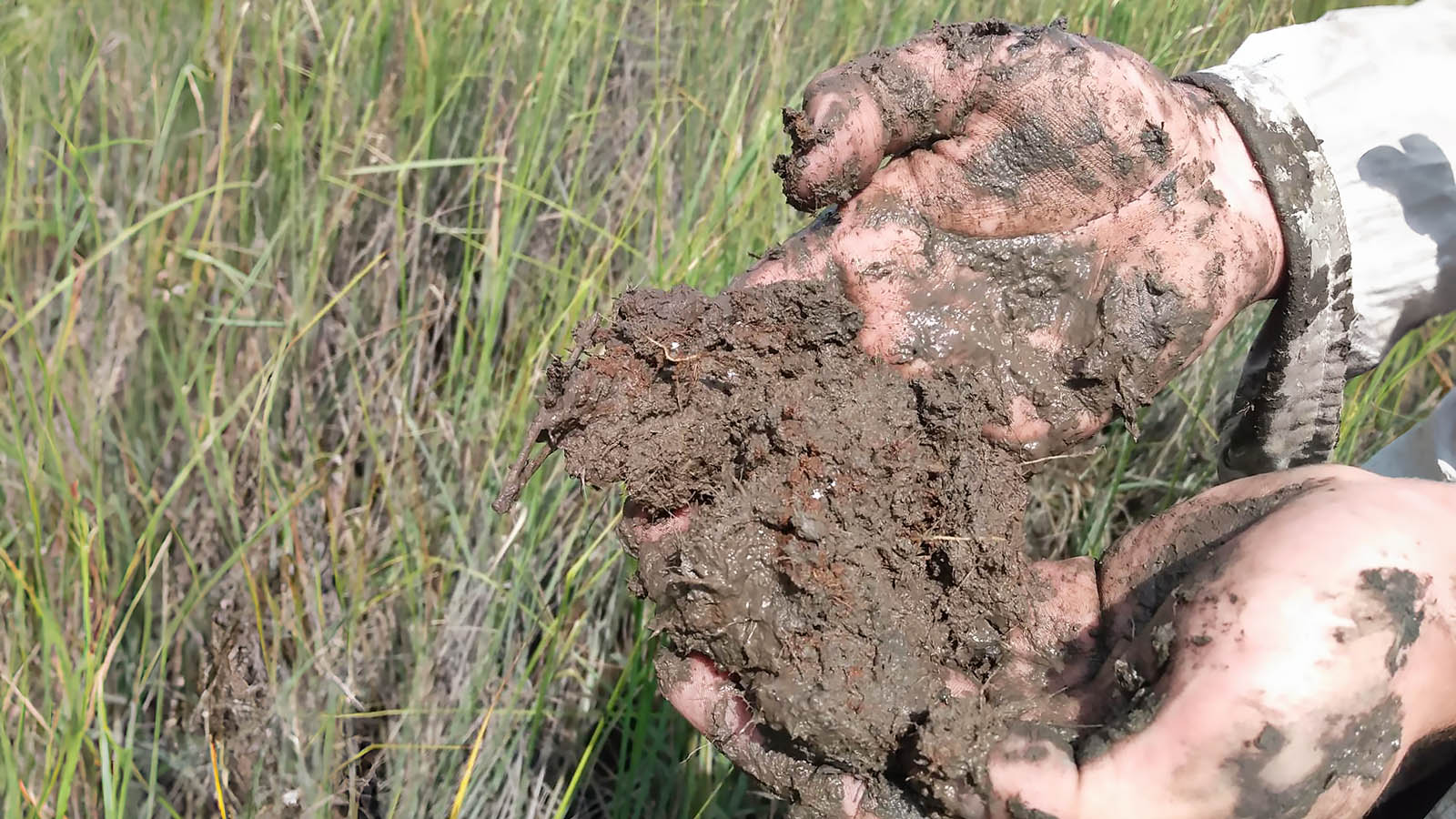
People in Our Research Group
Post-Doctoral Researchers:
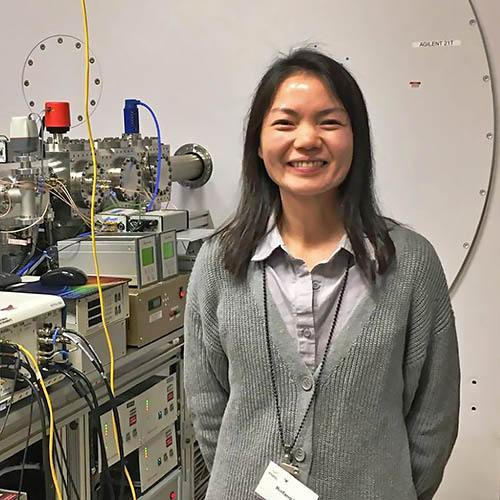 Ruifang Hu
Ruifang Hu
Ruifang is a postdoctoral researcher in the lab currently working on optode chemical imaging techniques to examine the spatial and temporal dynamics of O2 and CO2 in the rhizosphere soil of Phragmites australis to determine the role of diurnal redox oscillations on the C cycle. She will also investigate the impacts of rapid sea level rise on coastal soil biogeochemistry. Ruifang was born and raised in a village in Hunan, China, obtained her BS degree (2011) in Chemistry from Wuhan University, and PhD degree (2022) in Soil Chemistry from the University of Delaware. Her previous research backgrounds include trace metal biogeochemistry cycling in rice-soil systems, legacy soil phosphorus cycling in alkaline agriculture soil, and soil carbon characterization. Ruifang likes mountains, hiking, jogging, tea, and cooking.
Graduate Student Researchers:
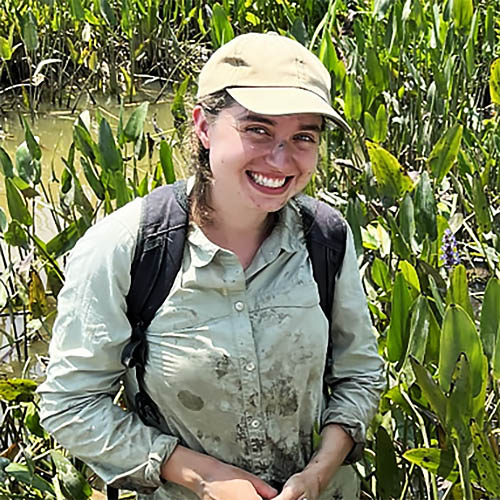 Sylvia Jacobson
Sylvia Jacobson
Sylvia Jacobson is a PhD student studying how sea level rise alters coastal wetland soil biogeochemistry to help predict marsh loss and migration. She is partnering with the Chesapeake Bay—Maryland National Estuarine Research Reserve as part of a NOAA Margaret A. Davidson fellowship. Sylvia graduated with a BSE in Environmental Engineering from Princeton University in 2017. She then worked in environmental consulting with Anchor QEA for two years, where she worked on remediation projects for contaminated waterways. She completed a master’s degree from the University of Maryland in 2022 through a MD Sea Grant Fellowship. Her master’s research also revolved around coastal wetlands, specifically on strategies for removing invasive Phragmites australis and restoring native wetland plant communities. In her free time, Sylvia enjoys exploring the woods with her family.
Sylvia Jacobson's Fellowship story
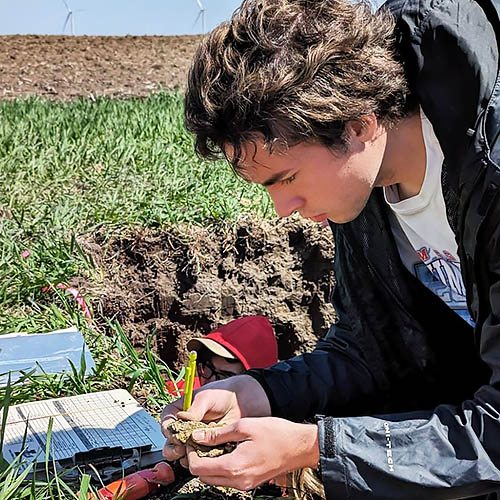 Jason Manzon
Jason Manzon
Jason is a Master’s student in the lab researching organic matter integration into agricultural soils as part of a project with the Harry R. Hughes Center for Agro-Ecology. His goal is to characterize the molecular composition of different organic matter fractions as affected by future climate scenarios. Jason recently earned a BS in Environmental Science & Technology from UMD with a Natural Resources Management concentration and minors in Geographic Information Science, Soil Science, and Sustainability Studies. Jason started his research in agricultural systems during his time as a peer research mentor for the UMD First Year Innovation and Research Experience (FIRE) where he looked into optimizing citrus disease abatement. He is an Ernest F. Hollings scholar which gave him the opportunity to conduct sensitive species health research with the NOAA Office for Coastal Management at the Old Woman Creek National Estuarine Research Reserve. His interest in soils comes from his experiences and coursework at UMD.
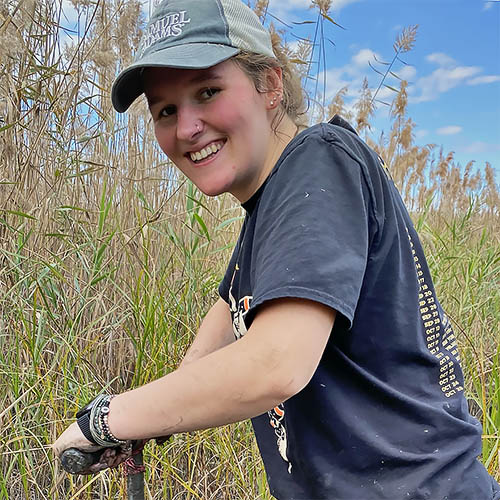 Isabelle Van Benschoten
Isabelle Van Benschoten
Isabelle is a MS student in the lab looking into carbon transformations affected by redox oscillations of the Phragmites dominated areas of the Global Change Research Wetlands (GCREW) within the Smithsonian Environmental Research Center (SERC). Originally from the Hudson Valley in NY, Isabelle grew up around wetlands and understood their importance in estuarine systems. While completing her undergraduate degree in Environmental Science & Technology with a focus on Ecosystem Health at the University of Maryland, she investigated the microbial community changes within a Phragmites wetland restoration plot. From here, she continued this work into her MS by seeing how the plant influenced not only microbes but also their link between carbon transformations/greenhouse gas emissions, and oxygen concentrations.
Undergraduate Research Assistants:
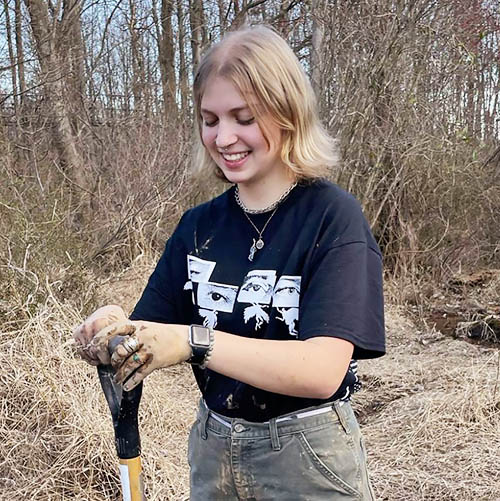 Caroline Melton
Caroline Melton
Caroline Melton worked as a junior undergraduate student in the lab completing a BS, and now is working on a MS in the adjacent Yarwood Microbial Ecology and Biogeochemistry lab in Environmental Science & Technology, with a concentration in Soil and Watershed Science and a minor in Geochemistry. Since starting at the University of Maryland in the fall of 2021, Caroline has worked on a number of different soil and wetland related research projects in the ENST department. In the Wilmoth Lab, Caroline primarily worked with Isabelle on her Phragmites research. She has worked as a Peer Mentor for the College of Agriculture & Natural Resources. Her main areas of interest lie in soil microbiology and biogeochemistry.
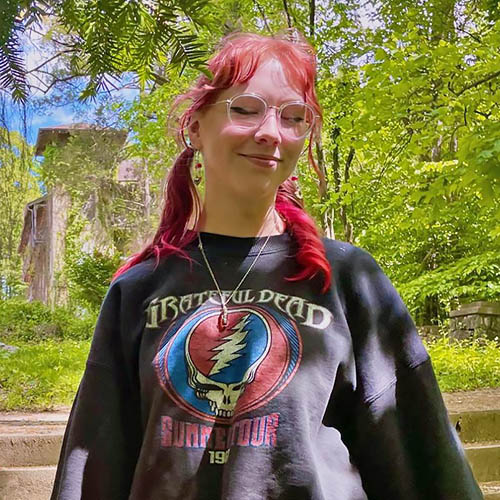 Hannah Moore
Hannah Moore
Hannah Moore is a junior undergraduate student in the lab completing their BS in Agricultural Science and Technology with a focus in Environmental Horticulture and a minor in Soil Science. Hannah’s primary work in the Wilmoth lab has been split between assisting Isabelle in her study of carbon transformations in redox-active soils– specifically Phragmites dominated areas in the Global Change Research Wetlands (GCREW) at the Smithsonian Environmental Research Center (SERC)– as well as working with Jason in conceptualizing and implementing research procedures for his project studying organic matter integration into agricultural soils through the Harry R. Hughes Center for Agro-Ecology. Hannah’s upbringing in wetland-rich areas of CT (and a brief stint in tropical Panama) fostered a loving fascination with the environment and nature that drives their research endeavors.

